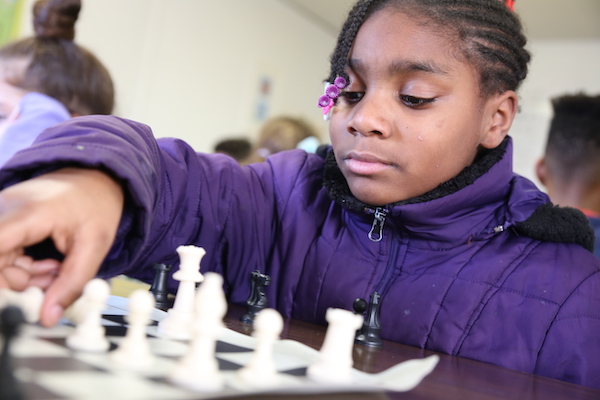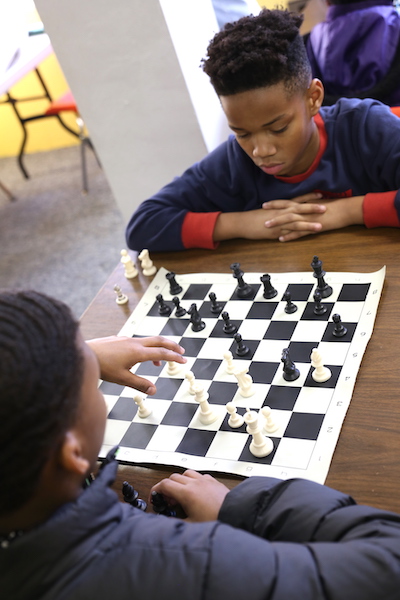The Early Lesson of a Different Path: Brian Walker’s Take a Stan Chess Club for Kids

Header: Destiny Erxleben. Above: Dejuan Clardy; Jarisas Portee (top) playing Dejuan Clardy
Chess club’s name memorializes founder’s son
Written by William Bryant Rozier
The activity rooms at the temporarily-closed Boys and Girls Club on Fairfield Avenue, still in the throes of renovation, are already booked, like a payday check that’s already spent. No place to go, all of those children and employees of the club occupy every nook and cranny across the street at Wings of Deliverance Tabernacle Holiness Church (THC), at 2502 Fairfield Ave.
It was a Wednesday so the eight to 12-year-old group, around 14 kids, of the Take a Stan Chess Club was meeting on the second floor of the church; a younger group (age seven to nine) meets on Mondays at the First Baptist Church off Creighton.
The club’s going so well that the consensus from the kiddos is to meet every day; on a recent Wednesday, seven hopefuls showed up wanting to learn chess. All of the instructors are volunteers with full-time jobs, making daily meets impossible. “It’s hard to turn down a kid who wants to learn,” said chess club founder and instructor Brian Walker.
Take a Stan was named after Walker’s late son, Stanford, who was shot in March 2010, two days before his 21st birthday. Stanford was a good kid but who “just made some bad choices,” Walker said, who was inspired, with his young chess players, “to get into their heads early that there are different avenues.”
Walker was a member of Portage Middle School’s chess club that one of his teachers started, got “beat up really bad” but came back for more, and eventually won the title of club champion. At Elmhurst High School, he met some like-minded dudes and when “everyone was clubbing,” they were bunkered up at Walker’s mom’s house, or some other place, playing chess.
One of Walker’s volunteer instructors, Phil Harbegger, was his former algebra and trig teacher at Elmhurst. “We used to be scared to go to his class because he demands the best out of you,” he said. He’s doing the same thing for the Take a Stan chess players. “They love him.”
The experience level of the older group ranges from zero to some time playing chess. Some think it’s checkers. “No, this is a thinking game,” Walker said. “A lot of them were getting frustrated that it wasn’t moving fast enough for them.” And they become distracted, he said.
Out of all of his players and groups, Walker said he had about six players that can compete with about anyone; he’s scouting places he can partner with for his players to compete against. There’s a guy in Chicago, who runs Little Lion’s Academy, that’s a possibility. A lot of Boys and Girls Clubs around the country have chess teams. They’ve competed at tournaments at the library. One of youngest and strongest competitors is a seven-year-old who was dominating at a tournament until he became…distracted. Walker’s also waiting for more of his players to improve and become more focused so the club can do more tournaments.
Walker’s best player, 12-year-old Dejuan Clardy, has been coming to the chess club for two years. Clardy learned chess from his grandfather, so he has more experience than most of Walker’s players, but forgot enough about the game to learn new techniques and structures from Walker and his volunteer instructors.
Clardy has beaten his mom and his older sister, so he’s already playing above the rim, a little bit, by battling older competitors. He’s a point guard on his Horizon Christian Academy team; his analogy of chess pieces (the King, the Queen, the Rooks) with basketball positions (the Point Guards, the Center) dovetailed into the super-value of practice.
He told the story of a couple of teammates who couldn’t play in a game because they weren’t going to practice. “If you don’t come here and understand chess,” Clardy said, “then you’re really not going to be able to go to tournaments.”
Speaking of real-life applications, Destiny Erxleben, age 9, who’s been coming to Take a Stan for two years, said the chess club has helped her with math. It’s about the process for her, the steps…the value in the one-piece move, then another: “It’s not about chess, it’s about moving the pieces.” And “it’s not all about winning because when you make mistakes you know, you won’t make a mistake again.”
For inquiries about the Take a Stan Chess Club, call Brian Walker at 260.443.1147.


